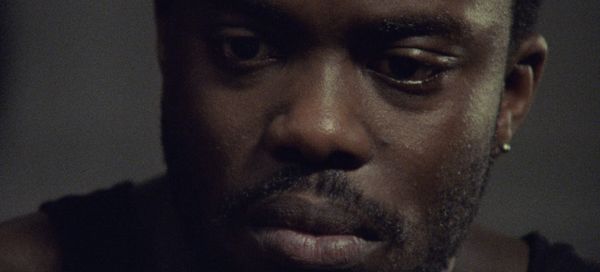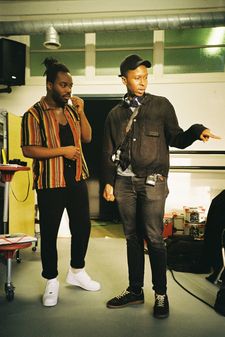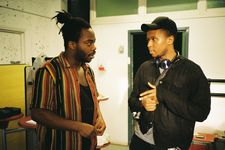 |
| Play It Safe |
It took quite a while to pin down Mitch Kalisa for an interview about Play It Safe – but some films are worth it. When we finally meet, I tell him straight out that no other short film has impressed me as much this year. He thanks me and blushes a little, but takes it in his stride – with a BIFA nomination now in hand and a chance of qualifying for the Oscars, it’s something he’s getting used to hearing.
It’s a very long way from what he imagines when he first started developing this film about an acting student who struggles with being the only black person in his class. Struggling with stereotyping and the sort of low level, possibly unconscious racism that’s really hard to tackle, and asked by classmates to accept a racially stereotyped role in their latest play, Jonathan (played by Jonathan Ajayi) reaches breaking point during an improvisational scene in which the class are required to play animals and he receives a card with an ape on it – but rather than back down, he turns in a performance that dramatically shifts the balance of power. Mitch tells me that the seed of the story came from personal experience.
“I used to go to weekend drama classes when I was a kid,” he says. “In most cases, I think there might have been some other people of colour, but I was definitely the only black guy in the classrooms. Nothing overtly racist that ever happened to me there but I always had this kind of uneasiness. Just something I can’t put my finger on. basically. So that feeling always stayed with me. And then as an adult, entering university and then entering into the workplace and then having that those feelings again, you know, where people are well intentioned and they aren't doing anything that's overtly racist or trying to marginalise you, but you still feel that something unconscious is going on, that makes you feel marginalised. So essentially, connecting that adult experience and looking back on that childhood experience, I was like, ‘Okay, this is the kind of thing that was going on.’
 |
| Behind the scenes on Play It Safe |
“I felt like to point out in an office type setting, an adult setting, wasn't that interesting. But once you take it to the classroom, and especially the drama classroom, where there’s performances and animal studies, which is always awkward anyway, that whole performance element of pretending to be animals, but yeah, really pushing it all the way with him getting an ape card, that felt like a powerful way of discussing the themes without me making something that felt really preachy.”
I find it an interesting setting, I tell him, because it's something where one is supposed to be completely open and let oneself go emotionally in order to do that kind of work, but that’s very difficult in an atmosphere of prejudice. Was that an element that interested him?
“One hundred percent,” he agrees. “Because there's that feeling from personal experience but also through the casting process, I think all the people of colour understood this feeling really well, where you can understand that people aren't doing something on purpose. And then it kind of puts this dilemma on you, it puts this weight on your shoulders of like – especially as a black person – if you call them out, kind of to be angry and to be upset about it, it ticks this other prejudice. You know, now you're the angry black man or angry black woman because you've called someone out for something they weren't intentionally trying to do. Or at least they that's how they feel about it, and no one can overtly outwardly tell that those were their intentions. So now you've been made to look crazy and emotional and over the top.
“So yeah, that was a big element. I didn't get to see that often on screen, where that subjective experience of in between a rock and a hard place and, like, either way that I go it's bad. There's no way of getting out of this without causing lots of friction or whatever. And yeah, as a performer, someone who needs that space, that un-judgemental eye around him in order to flourish and to go inside of himself and get this performance out. It's the most hostile conditions to do that in.”
Something that really impressed me about the film is how well it depicts micro-aggressions, the low level experiences of prejudice and discrimination which build up to create high levels of stress. How did he approach structuring the script so that it could do that?
“I really wanted to make something that was very tight and short, like, genuinely a short film, rather than trying to allude to a bigger world,” he says. “It'd be in this moment that you understand all this history, and have this feeling of where this story would continue. So we start right in the middle of a lot of things. They've obviously got this party going on that evening, and there's the play coming up. And there's all these elements in which he's been experiencing this build up of micro-aggressions, and moments of prejudice and marginalisation. Because the performances are so good, especially Jonathan, you're able to see that. When the guy is calling him and they're trying to get him out to this gig or whatever, you know he's been in this position many times before. Like, there’s that ‘Oh, here we go again’ feeling.
“Initially, I'd had the the guys asking him about this play as if it was the first time they'd come up with it. But I was again, like, okay, it's more interesting if actually now they recruit the teacher to come and convince him. And she's kind of a bit clueless to the grander picture, basically. I was trying to build elements that let us know, this isn't a one-off occurrence. This is how he's been living for however long he has been at the school. And this is the boiling point of many little moments like this just building up over and over, that climax of this ape card.
“I wanted to really kind of lay this the seed of doubt over the ape card and how it comes up, because essentially, it could be a complete coincidence or it could be something hidden. He probably thinks the boys planned it. And I wanted to make that ambiguous because yeah, when you're wound up to that stage, you might even flip out over something unrelated, but it's been coming from this place, it's not just like this unrelated thing. So obviously, we've got the privilege of seeing it through his perspective, but then we can also see through the classmates’ eyes, who are like, ‘Whoa, this was an accident. He's overreacting,’ you know. That whole element of it. And just the inherent tension in the storyline, that thriller kind of movement that I had with placing all these dominoes that fall into each other and then have this climax. That's how I was thinking about having these moments of micro-aggression.”
I tell him that I was struck by the moment where the teacher comes in, and it's really strong, because there's that sense of despair but there's also the awareness people like that often tried to smooth things over when they see a situation like that, which seems to be very much playing it safe then and the opposite of what that film is about. And something else that interested me is the way that when you’re facing prejudice like that, there's always that sense that you're being the awkward one, or that it’s your responsibility to deal with all the awkwardness of the situation. And what Jonathan does with his performance when he gets the ape card really turns around and makes everybody else feel awkward.
 |
| The white gaze |
“Yeah, I love the way you describe it, because that was kind of my intention,” Mitch says. “I think a lot of media stuff that deals with these kinds of issues, they deal with the victimisation. And I wanted to make something a bit more empowering. I wanted to make sure that, although we see Jonathan being victimised, he shows up for himself and he's able to turn the situation – hopefully – into a teachable moment for the classroom. For him to be like, you know, ‘I'm not going to be this. I'm not going to partake in this anymore,’ because he has been suppressing his feelings, he's been trying to fit in, he's been playing it safe and he doesn't want to be upsetting anyone or making anyone feel uncomfortable. But in this moment, he shows up for himself, he puts himself first in this situation.
“I wanted to do that through the filmmaking in a way as well. A lot of the focus has to be on the victimisation. And for me, especially in that final sequence, it was about trying to hold up a mirror a little bit to the audience, to the teaching institute, to the upper end of that hierarchy. It's uncomfortable to see it because it's this ugly mirror version of yourself. And hopefully, in that there are questions that arise. Because I think if you saw his performance, then it becomes about art. Isn't this guy really good at acting? Or you're picking holes in his acting performance. It distracts you from the actual issue.
“I really wanted to create something that could inspire a conversation based on that thing, where it's actually not Jonathan's responsibility to make everyone feel comfortable and turn the other cheek every time. And again, this is like a problem that has to be sorted out not by him, but by the system that has placed them into this really terrible position.”
To achieve this, Mitch kept his camera focused on the other students watching Jonathan’s performance rather than on Jonathan himself. It’s a very effective approach, but part of what makes it work so well is the sound design. How did that develop?
“I really loved working on the sound design because yeah, it was, I think, in the initial draft of it, that I realised that the designers were using these kinds of archetypal sounds for when you're honing into someone's perspective. It's normally droning type sounds, and then there's a tinnitus type vibe. It's this film language that we're really familiar with, but it heightens it in a way that makes it slightly unreal. And I wanted to keep everything within that kind of mundane world. So we stripped everything down until the sounds were mostly the aircon systems and background noise and his feet stomps and stuff. And it was like, by having so few elements, you could remove one and it created this vacuum, this auditory space. And when he did something in that space, it's so heightened without it being at the top of a really complex mix of droney sounding stuff.
“I love the the silence of it as well because it allows your imagination to go into overdrive making up the performance as he's doing it. You don't see it but you do see it, you know, like he's running over here and then he's stroking this person's hair just off screen. It made it hyper real without making it super in your face with lots of sounds. So that was a very fun process, to work on the sound design, and yeah, I think it makes that sequence so tense, so visceral, and it feels like you've seen a lot that you actually haven't seen, little slivers of stuff.”
And obviously it all hinges on that fantastic performance. How did that come about?
“I feel so lucky to work with Jonathan because I think he's amazing,” he says, smiling broadly. “I can see him going on to be a huge star. We had a casting process and we were looking at people already. Chris, the producer, he knew Jonathan through his brother or something, I think they went to the same school. And he was like, ‘I think I know someone who'd be great for this role,’ and he sent me his reel. And he was very close to what I’d pictured. Essentially, I wanted someone who had that duality, who could be kind of soft and vulnerable and really endearing. And Jonathan has that kind of smile, like as soon as he smiles, he's just such a warm looking person. But he had the physicality to turn things on their head in that final sequence. And I think a lot of the actors we were looking at just didn't have that presence anyway.
“So after physically feeling he was right, we talked about the script, and at first he was like, ‘This is tricky. If it doesn't go well, this looks bad on everyone.’ I was like, ‘Yeah, fair play.’ And it was good that he was challenging me on that level, because I knew he was passionate about the theme and making sure it was done right. And then yeah, once we talked about it, he just – as you want from a collaborator – he was just so on the money with what we were trying to achieve. He knew I wasn't trying to create good guys and bad guys.
 |
| Working on character in Play It Safe |
“I always worried some people were seeing the film as, like, some kind of like government film about bullying in the classroom, you know, like a very dry version of what it is, but he really got it wasn't this kind of educational film. I was trying to be subtler, to leave a lot more going on in the minds of the audience rather than trying to spell things out. So once we started talking on that level, I just instinctively was like, ‘Yeah, it has to be Jonathan.’ We had to move a few things around to make it work but as soon as he jumped in, he was fully in. And because he's doing very well as a young actor, all the other young actors involved all knew him and were really kind of in awe of him. And he was so generous with his time and experience. I think everyone benefited from from his presence on set, and the performance speaks for itself. He killed it.”
I ask Mitch how he feels about the attention that the film is now getting from awards bodies.
“To be honest, this stuff is still super unreal!” he says. “Like, even if you asked me like, ‘What were your wildest dreams?’ I and Jaime [Ackroyd], my cinematographer and Chris [Toumazou], the producer, we talked about it beforehand. And my wildest dream was getting a Vimeo staff pick. If we get a Vimeo staff pick, yeah, I've completed life, that would be a really amazing achievement. And then when I went to SXSW, yeah, that that was sick and just really cool, to know that I’d branched out way past my little world. And yeah, to hear about BIFA and the potential for the other bigger awards, I’ve no words really, but obviously I’m super grateful to be recognised by them, to be part of that conversation.
“I've met most of the filmmakers who were nominated and I've seen their films, and they're all incredible. For me, that's the biggest pat on the back – just to be in the same vicinity, and part of that same crowd. It's incredible. And the fact that now the film has found this crazy audience where people are finding it from festivals and whatever, and emailing me and being like, ‘Wow!’
“I hope this film can be the start of an interesting conversation and allow people to go into this tricky subject matter. It feels like that's what's been happening. Some schools have reached out and said they showed it to the class and they did like a discussion about it and stuff like that. And all those things are so much past my wildest dreams for the film. So I'm just enjoying it. It's rare that you dream something and then make it the way you hoped it would be. That's hugely rare. But then to do that and find an audience of people who respect what you've done, that's more than any dream coming true. The whole year has been like just a big high for me.”
So what does it mean for him as a filmmaker? Where does he go from here?
“Right now I’m developing some feature length material,” he says. “For me, the biggest lesson throughout this process has been making work that comes from that authentic place. I think a lot of the work I was making before was all about, I don't know, mostly visual exercises and mostly like, ‘This is an interesting scene. This could happen, that can happen’ – it was always coming from that place of hoping to catch attention. Play It Safe was the first thing that I'd written that was very honest and kind of vulnerable for me, because it was coming from a true place. It was touching on big themes. It could could be misinterpreted or just not land.
“Jonathan has the same lesson I learned in the filmmaking process. He’s playing it safe and yeah, then going into this wonderful place and letting work come from that. So that is something that I’ve taken to my new projects, where it's trying to come from an honest, authentic place in the material. And starting from that, instead of starting from more superficial elements. That's been the takeaway for me. And yeah, I'm developing my first feature film so I'm hoping that takes shape early next year. And then exploring other ideas. So fingers crossed there'll be a couple of projects that come from me in the next couple of years.”
I assure him that we will definitely be looking out for them.





















